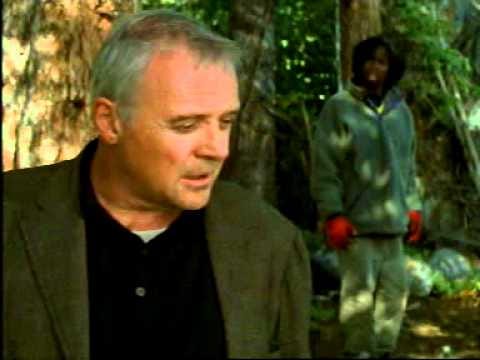Mark 1:9-15 | Revised Common Lectionary | EnterTheBible.org
First Sunday in Lent | 02.18.2024
Context: After a brief jump forward to Mark 9, we jump back to Mark 1. In the few verses before this moment, Jesus was baptized. Here, we see the immediate aftermath, though it is only described in the briefest of terms.
12 And the Spirit immediately drove him out into the wilderness. 13 He was in the wilderness forty days, tested by the adversary, and he was with the wild beasts, and the angels waited on him.
The Edge | 1997
IMDb | Letterboxd | RRMC
Context: Charles Morse (Anthony Hopkins) and Robert Green (Alec Baldwin) are on friendly terms, but it’s becoming clear they both are in love with the same woman - Charles’s wife. Now, they and Stephen (Harold Perrineau) are stranded in the woods after their light airplane crashes. Here, we see the immediate aftermath of the crash as the trio gets their wits about them.
Charles Morse: You know, I once read an interesting book. It said that, uh, most people lost in the wilds, they, they die of shame.
Robert Green: What?
Charles Morse: Yeah. See, they die of shame. "What did I do wrong? How could I have gotten myself into this?" And so they sit there and they... die. Because they didn't do the one thing which would save their lives.
Stephen: And what is that, Charles?
Charles Morse: Thinking.
Commentary:
I often wonder what exactly happened in the wilderness for Jesus after his baptism. Before you say the Bible is clear, just wait a moment. The Gospel of Matthew says Jesus overcame the temptations of economics, religion, and politics after 40 days. So what happened in those 40 days? The Gospel of Luke says Jesus was tempted during those 40 days, but the scene of temptation we see in Matthew likewise takes place after the 40 days. As for the Gospel of Mark, it takes away some details while adding others, and all in just one short verse.
Jesus is tested, but no details about it like in Matthew or Luke. Then, he was with wild beasts? I’m the kind of person who would love a list of the wild beasts so I can picture Jesus observing them, walking with them, or defending himself against them. I don’t like that Wikipedia says more about the wild boar, deer, hyenas, jungle cats, and bears (Oh, my!) than the Bible does, but that’s where we’re at. Then, the angels waited on him. I’m curious what that looked like, too. Did they leave him a bread basket with honey and tea? A bit of manna or lamb or other food to invoke imagery from scripture? Could he have had a #1 with fries even if it hadn’t been invented yet because God transcends time and space? I’m being a bit silly, but that’s where my mind often wanders when I’m left to fill in the gaps of scripture. I always want to know more and it’s fun to think about.
We do know that however long Jesus was in the wilderness and whatever he did, we know it likely wasn’t a literal 40 days and it likely wasn’t anything too extravagant. “40” is a number used in the Bible to mean “a lot.” How many days and nights in the ark? How many years in the desert? How many days in the wilderness? “A lot.” It’s a literary device. Likewise, I know what I do when I’m in the wilderness on purpose: I set up a safe and practical place for camp, make sure everything is ready, then take time to be at peace. I can’t imagine Jesus would have done much different. Whether he found a cave or an outcrop of wind-blocking trees, he likely made camp and set about a time of prayer, meditation, and taking time to be at peace with God.
What we know is Jesus returned from the wilderness a changed man. He had a clearer understanding of who he was, who is God, and his relationship with God. He came back knowing what would happen if he started his journey, and knew it was more important than staying in the wilderness. Even if there were things he liked about being out there on his own, being at peace, perhaps with bread baskets, he came back to do the work.
The Edge is a movie that balances “I’ll show you who I am” dialogue and “I’ll show you how I am” action quite well. You get to know the characters because they tell you what’s on their mind. Three men stranded in the wilderness leave no pretense of “alphaness” as they constantly share their feelings about being prey to the actual alpha of the woods, the bear who stalks them.
When Charles (Anthony Hopkins) tells his companions they risk their own deaths if they don’t take a moment to think, he is telling them that no matter how they got into the wilderness, only one thing leads them out. Essentially, they need to take time to be at peace. They aren’t there on retreat, nor are they their to intentionally discern their mission. They’re there because of poor circumstances, and even poorer relationship dynamics back home. But back home won’t be fixed if they don’t survive. And they won’t have the chance to survive these poor circumstances if they don’t take time to be at peace. Over the course of the film, we see them make a plan for the bear, make a plan for health care, make a plan for friendship. All of this is about peace overcoming fear and the unknown.
If the wilderness is an allegory for anything, it is the unknown. And taking time to be at peace with God is what breaks through that unknown wilderness. Or at least, makes it something one feels better suited to handle.
When have you been in the wilderness? Literally and figuratively? How did you make your peace? How did you emerge from the wilderness a changed person?




